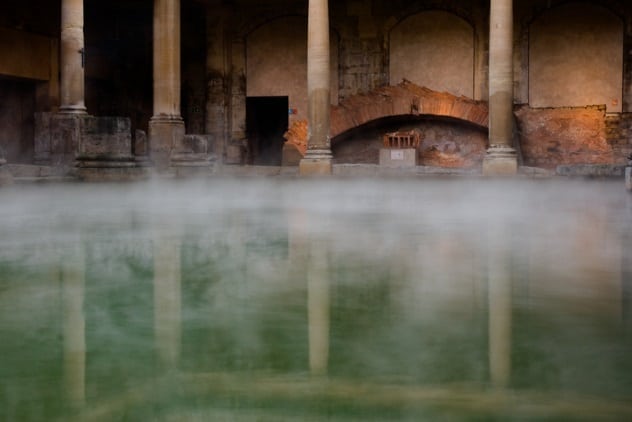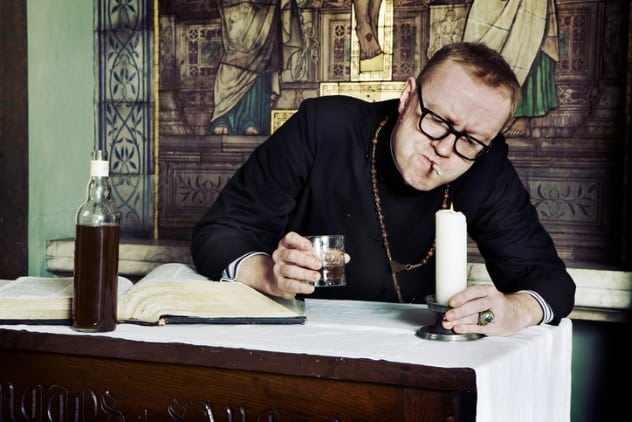 Miscellaneous
Miscellaneous  Miscellaneous
Miscellaneous  Politics
Politics 10 Lesser-Known Far-Right Groups of the 21st Century
 History
History Ten Revealing Facts about Daily Domestic Life in the Old West
 Weird Stuff
Weird Stuff 10 Everyday Products Surprisingly Made by Inmates
 Movies and TV
Movies and TV 10 Actors Dragged out of Retirement for One Key Role
 Creepy
Creepy 10 Lesser-Known Shapeshifter Legends from Around the World
 Animals
Animals 10 Amazing Animal Tales from the Ancient World
 Gaming
Gaming 10 Game Characters Everyone Hated Playing
 Books
Books 10 Famous Writers Who Were Hypocritical
 Humans
Humans 10 of the World’s Toughest Puzzles Solved in Record Time
 Miscellaneous
Miscellaneous 10 Ironic News Stories Straight out of an Alanis Morissette Song
 Politics
Politics 10 Lesser-Known Far-Right Groups of the 21st Century
 History
History Ten Revealing Facts about Daily Domestic Life in the Old West
Who's Behind Listverse?

Jamie Frater
Head Editor
Jamie founded Listverse due to an insatiable desire to share fascinating, obscure, and bizarre facts. He has been a guest speaker on numerous national radio and television stations and is a five time published author.
More About Us Weird Stuff
Weird Stuff 10 Everyday Products Surprisingly Made by Inmates
 Movies and TV
Movies and TV 10 Actors Dragged out of Retirement for One Key Role
 Creepy
Creepy 10 Lesser-Known Shapeshifter Legends from Around the World
 Animals
Animals 10 Amazing Animal Tales from the Ancient World
 Gaming
Gaming 10 Game Characters Everyone Hated Playing
 Books
Books 10 Famous Writers Who Were Hypocritical
 Humans
Humans 10 of the World’s Toughest Puzzles Solved in Record Time
10 Peculiar Questions Decided By Church Councils
Christian churches have a long history of making joint decisions about matters of faith. Since the first century, gatherings of Christian leaders (usually called councils or synods) have formed to answer concerns about doctrine. Some of the most momentous councils are the most well-known. The First Council of Nicaea set out a creed stating fundamental Christian beliefs, the Council of Ephesus dealt with several major heresies, and the Second Vatican Council opened the doors to widespread renewal and upheaval throughout the Catholic Church. All of these are rightly remembered for their weighty issues.
Some early council decisions, however, seem obscure, frivolous, or simply outlandish. What seemed like important issues back then come off as quite strange to most of us today. At times, these decisions dealt with complex theological issues; at others, it’s likely that some odd incident had riled up the clerics on a particular issue. Either way, you may not have expected major religious debates to cover subjects like . . .
10 Whether To Eat The Meat Of Strangled Animals

This was an issue that came up at the very first council, the Council of Jerusalem (circa AD 50). Believe it or not, the meat question connects to a major point in defining Christian identity. Early followers considered themselves a sect within Judaism and conducted themselves accordingly—including the practices of circumcision and kosher eating. Kosher is where the strangled animals come in; keeping kosher requires meat animals to undergo a special method of slaughter, involving a quick and thorough slicing of the throat. Strangling the animal is forbidden (in addition to being unpleasant).
Soon Gentiles (non-Jews) started converting to Christianity, notably due to the preaching of St. Paul. Did they have to become Jews first, as some sort of prerequisite? Some did. Others objected, and before long, a multitude of opinions on the topic were leading to a double multitude of arguments. It was Christianity’s first doctrinal crisis.
The council convened to settle the issue, headed by St. James the Just (making it the only council presided over by one of the 12 apostles). Debate was fierce, according to accounts in the Biblical Acts of the Apostles. But eventually, James made his decision: Strangled animal meat was still forbidden, but most other Jewish practices, including circumcision, would no longer be required.[1] Later disputes would walk back the meat prohibition even further. But suffice to say, James’s decision marked a major point in the divergence of Christianity from Judaism.
9 How Much Does Bestiality Really Matter, Anyway?

The short answer is that bestiality is still a sin in any form. The peculiar thing about the Council of Ancyra (in 314) was that it got down in the weeds about the relative severity of bestiality, depending on certain factors. Our modern obsession with sorting things into categories apparently goes back a long way.
To the clerics at Ancyra, apparently the key factors were age and marital status. Married men over 50 got hit the hardest, since cheating on your spouse with an animal (when you’re certainly old enough to know better) is a major jerk move. These men would be excommunicated until they were lying on their deathbed. Occupying the middle category were married men under 50, who would spend 30 years in penance before being restored to full Communion. Those most lightly punished were youths under 20, who would suffer a still-lengthy 20 years of penance (though time off for good behavior was recommended).[2]
Curiously, no penalties were prescribed for women practicing bestiality. Presumably it was a male problem? Regardless, the moral was clear: Any shepherds with an unhealthy affection for their sheep had better get it out of their system early!
8 Absurdly Specific Soap Opera Dramas

One nice thing about the Ten Commandments is that they are almost universally applicable—everyone’s had the opportunity at some point to lie, steal, or dishonor their parents. Most church council declarations are intended for similar universality. Occasionally, however, the circumstances they describe are so precise that the clerics must have been either engaging in thorny theological brain teasers or really pissed off about the actions of a particular person.
Take the Quinisext Council (692), for example. One of its pronouncements forbids a mother and her daughter from marrying two brothers, or a father and his son from marrying two sisters. The reasoning was that familiarity of bloodline and familiarity of sexual relations should not be too closely intermingled. Still, it’s hard (and rather uncomfortable) to imagine these situations coming up very often.[3]
The grand prize for implausible drama goes to the Council of Ancyra again. That council devoted one whole declaration (or canon) to ascertaining the precise sinfulness involved in the following situation: A man, while engaged to a woman, deflowers her virgin sister. He goes ahead and gets married, while the sister turns out to be pregnant. In shame, the sister kills herself (specifically by hanging). Sounds right out of a particularly macabre Days of Our Lives episode, doesn’t it?
For what it’s worth, the council decided that anyone aware of the facts in such a situation (who were accessories to the misdeeds for not stopping them) was to be excluded from full Communion for ten years. Presumably the fornicator’s crime was already covered under existing church law. It does lead us to wonder who inspired this incredible scenario—and whether they got what was coming to them.
7 Whether You Can Bathe With A Jew

As discussed above, there has always been a tension between Christianity and Judaism, born of the close relationship between the two. Some Jews regarded Christians as deluded breakaway cultists; some Christians saw the Jews as stubborn obstructionists who refused to acknowledge Jesus of Nazareth (and were guilty, as a race, for executing Him). While neither side has acted blamelessly, the majority nature of Christianity in most places has led to a lot of anti-Semitic rhetoric. Sadly, some of this did bleed into the church councils.
Several councils made declarations governing interactions between people of these respective faiths. Christians in Spain were forbidden by the Council of Elvira (c. 305) from eating with Jews, marrying them, or letting them give Jewish blessings over crops (because they would cancel out the Christian ones).[4] The Quinisext Council forbade consulting a Jewish doctor, receiving medicine from a Jew, or bathing with one. Note that here, we’re talking about the public bathhouses common in the Mediterranean world, rather than a private bathtub rendezvous. Such a tryst might better fall under the absurd dramas discussed in the previous entry.
To be fair, other councils were more understanding of the Jews—the Council of Nicaeanum (787) declared that Jews who had insincerely converted to Christianity must be allowed to live their true faith openly. And more recent interactions between religious leaders of these sibling faiths have emphasized their common fraternal bond, rather than family friction. But the anti-Semitic words of some ancient councils remain unsightly blots on the Christian record.
6 Whether Your Soul Becomes Spherical When You Die

Christians take bodies seriously. They believe that eternal life will include both body and soul united and that, therefore, what is done with the body can affect one’s salvation. That’s how you get Christian doctrines on sexuality, particular methods of Christian burial, and whole papal treatises on the theology of the body. That’s also how you get angry denunciations by church councils of people who say the body is inferior to the spirit or that it doesn’t matter at all.
The Second Council of Constantinople (553) came together to condemn certain heresies attributed to the Christian scholar Origen of Alexandria. One of these, concerning bodies, proclaimed the following: The resurrection of Jesus was only ethereal, not physical; bodies will be destroyed at the Last Judgment and not be included in eternal life; and all souls (including that of Jesus) take the form of a sphere after departing the body. This last one seems an odd precursor to the spheres and orbs obsessed over by modern ghost hunters.
We can’t blame the kookiness of this one on the council; they came together to refute the soul spheres idea, not proclaim it. Anyone holding these views was declared anathema.[5] Considered the most extreme form of excommunication, this status was meant to impress upon a heretic the severity of his/her actions, warn others away from the same course, and convince the heretic to repent. The person was understood to be completely cut off from the church until they did so.
5 Can I Castrate Myself?

The idea of a man castrating himself seems abhorrent in and of itself; it’s hard for us to imagine someone having the desire for such an act, let alone the willpower to carry it out. But this was a real concern for the Eastern Church. Eunuchs—castrated men—had long been favored for certain court positions in Eastern Mediterranean society, and reports exist of men performing self-surgery in order to qualify for the job. Parents were also sometimes known to do this to their male children as a career boost (and it was apparently a successful tactic, though you certainly wouldn’t see it on any resumes today).
The church had always condemned this practice, but a council held at Constantinople in 861 came together to reaffirm the ban. It did so in the strongest possible terms. Priests who castrated themselves would be defrocked; laymen who did so would be barred from ever joining the priesthood. Those who helped others castrate themselves would be removed from office, if applicable, and excommunicated.
Here, the thinking came again from Christian reverence for the body, as seen in the previous entry. Christians have traditionally seen the body’s reproductive power as a key part of its identity and a way in which humans partake in the holy act of creation. Thus, to willfully mutilate the body, and reproductive organs in particular, is often seen as a grave lack of respect for the dignity of the human person. This was what caused the council to conclude:
The divine and sacred Canon of the Apostles judges those who castrate themselves as self-murderers [ . . . ] he who castrates another man is certainly a murderer. One might even deem such a person quite guilty of insulting creation itself.[6]
Notably, the council said there was nothing wrong with castration undertaken for medical reasons, since the intent is healing rather than mutilation. That proviso, at least, seems applicable to modern times. Thankfully, the reason for the necessity of the main decision has faded, as the occurrence of castration for success and profit seems to be reduced these days.
4 Can My Priest Be My Bartender?

Christianity has never been entirely of one mind about alcohol. Some denominations heartily embrace drinking in moderation and insist that authentic wine be used for Communion services. Catholic monks are even known for revolutionizing the brewing of beer! Some monasteries operate breweries to this day. Others are teetotalers, asking that members limit themselves to soda at parties and grape juice at Communion. But whatever the rules on consumption, it’s pretty rare to see modern religious personnel in the business of dispensing the alcohol.
It hasn’t always been so. Apparently priests, deacons, and the like were in the habit of running public houses (taverns) often enough in the Byzantine Empire to deserve the attention of the Quinisext Council (692). And the council was not in favor of it. They noted that, as much as it was unlawful for a cleric to merely enter a tavern, it was that much worse for a cleric to operate one. Such men were ordered to cease and desist, or they would be removed from their position.
Apparently, that didn’t do the trick. Nearly 100 years later, the Second Council of Nicaea was still addressing the problem. Not only that, but it had actually gotten worse; now people were actually converting monasteries and bishops’ residences into taverns! Those committing this sacrilege earned strong condemnation from the council:
If they be monks or laymen, that they be excommunicated, as those who have been condemned from the Father, and the Son, and the Holy Ghost, and assigned their place where the worm dieth not and the fire is not quenched, because they set themselves against the voice of the Lord, which says: “Make not my Father’s house an house of merchandise.[7]
One wonders what the council would think of the situation today, when beer can be ordered directly from monastery websites!
3 Is Being A Mime A Crime Against Humanity?

Many people have strong opinions about mimes; some these days find them downright unsettling. Early Christians would have agreed. Mime had existed for a long time in the Greek world, and it entered Roman culture as a particular form of grotesque and lewd comedy. Mime routines performed in front of audiences routinely mocked Christians, taking pleasure in blaspheming and belittling Christian practices.
Even when the Roman Empire began to Christianize, mime (and its cousin, pantomime) kept its crude and sacrilegious tendencies. To signal their opposition, the energetic clerics of the Quinisext Council decried the practice, along with stage dancing and animal slaughter as entertainment. After proclaiming that the council “universally prohibits so-called pantomimes and their theatrical exhibitions,” the clerics recommended excommunication for those who took part in miming or sought out the spectacle.[8]
Modern mime-haters might be able to get behind that.
2 Can Nuns Have Reverse Fashion Shows?

As part of the standard vow of poverty, monks and nuns agree to give up worldly things, including most (if not all) possessions. Their sacrifice of these things is supposed to reinforce the humility they practice and allow them to turn their attentions to God. It’s about killing selfish pride. That’s all well and good, but what about when advertising one’s humility becomes a source of pride?
Supposedly, certain convents established a practice of spectacles in which women taking vows to be nuns would elaborately shed their fancy attire. The practice probably grew out of a ritual whereby women would leave their prior worldly clothes behind and accept a nun’s habit. However, complications arose when some of the women began intricately bedecking themselves with all kinds of finery. Silk clothes, rich jewelry, and fine perfumes were supplied, all of it very costly (and very worldly). They would don the costumes, parade before other nuns, and then remove it all right before pronouncing their vows. It had the feel of a “last fling” before getting serious about this nun business.
The Quinisext Council took issue with this. In Canon XLV, the clerics rebuked these rituals, feeling that the focus had shifted from holy promises to overwrought pageantry.[9] They stated that prospective nuns, having resolved to take vows, should already have their minds on the life they were undertaking—whereas that last fling might cause them to waver in their commitment.
1 Can Holy Communion Be Sold In A Business Transaction?

Most Christian churches have a Communion ritual of some sort, evoking Jesus’s actions at the Last Supper. Some denominations, in more recent times, have deemphasized this aspect of a church service; others (such as Catholics) find Communion to be the very heart and soul of church ritual. But whether Christian sects believe the bread and wine to be merely symbols or the actual mystical presence of God, all of them agree that the practice should be treated with respect and solemnity.
It would shock most Christians today to hear that Communion wine and wafers were once bought and sold by unscrupulous clerics. This made one of the high rituals of Christianity into a mercenary transaction, tempting clergy to greed and tempting others to treat the Communion materials as a good luck charm. The poor would just have to find their grace elsewhere. Clearly, the more of it you can buy, the more of God’s favor you’ll receive—right?
“Wrong,” said the inexhaustible Quinisext Council. They called the practice evil in the extreme, comparing it to a Biblical figure who styled himself a priestly magician who could buy the power to perform miracles. Coins or any other payment for Communion were completely forbidden. As the Council rather poetically put it:
For neither is grace bought, nor do we impart the sanctifying influence of the Holy Spirit for money; but, on the contrary, it must be imparted to the worthy without the incentive of knavishness.[10]
All clergymen found to be demanding compensation in this way were to be deposed from office without ceremony.
The overall sentiment is still valid in modern times. The wealthy, comfortable televangelists and megachurch preachers of today might want to catch up on their reading.
David Ellrod lives in Maryland with his wife, three daughters, and one very excitable dog. He can be reached on Twitter via @DavidEllrod.
Read more about the history of Christianity on 10 Historic Battles That Helped Preserve Christianity and 10 Horrifying Tortures Of Early Christians.





